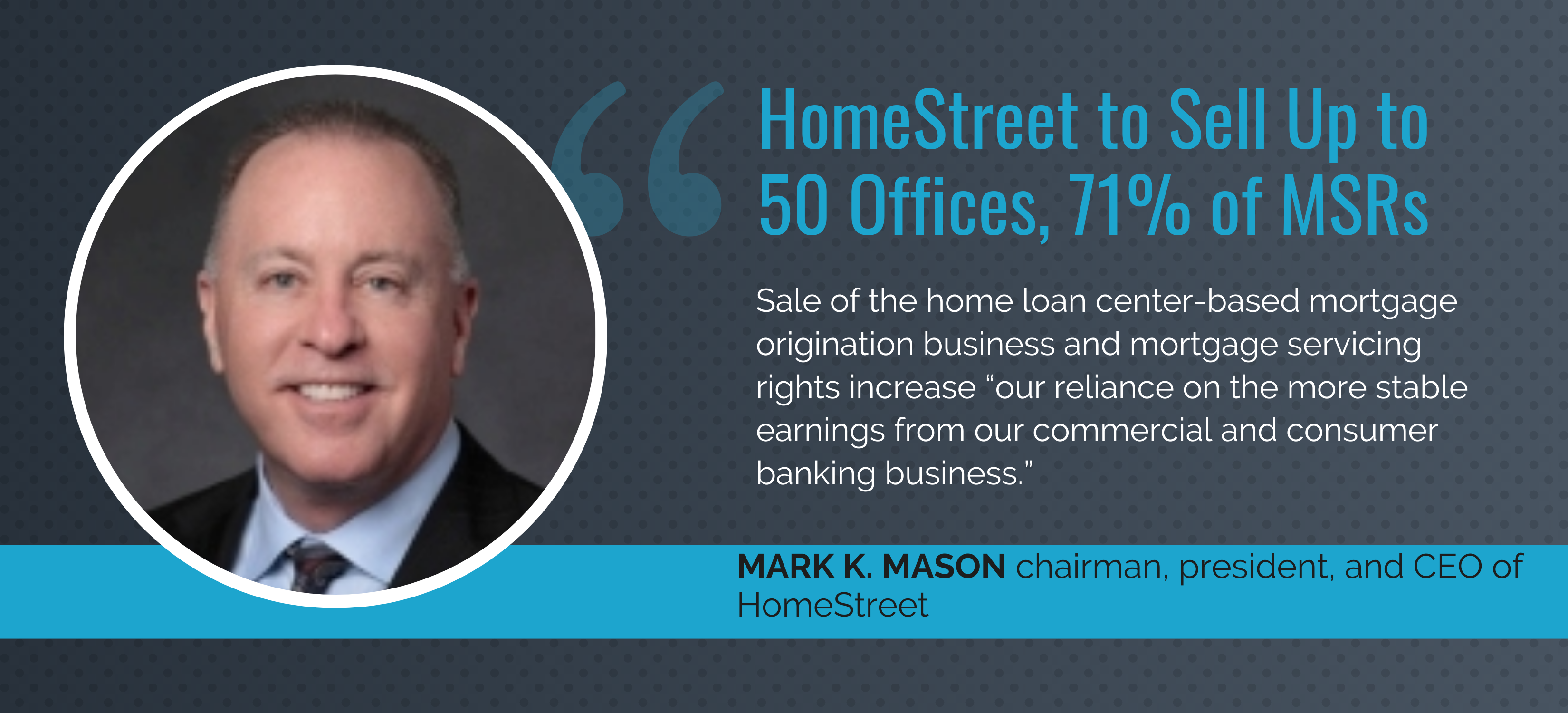-
 Navigating the Ever-Changing Mortgage Origination Landscape
Navigating the Ever-Changing Mortgage Origination Landscape Stay informed about the latest trends in mortgage origination, including rate fluctuations, regulatory updates, and the impact of technology in the housing market.
Stay informed about the latest trends in mortgage origination, including rate fluctuations, regulatory updates, and the impact of technology in the housing market.

matt
Class Valuation Acquires AMC
- Thursday, 04 April 2019

Class Valuation, a real estate collateral valuation and appraisal management, has acquired appraisal management company—Janus Valuation & Compliance.
“For us, clients come first. Strengthening our ability to support each client is something Class values highly.” said Mike Detwiler, CEO and partner for Class.
Janus has developed customized AMC service models with a focus on retail, credit union, and correspondent lenders in Texas and surrounding markets.
[adbutler zone_id="326314"]
[adbutler zone_id="326316"]
Janus Founder John Passero will join the Class Valuation team as regional chief operating officer to continue partnering with appraisers and financial institutions in the Southwest and Rocky Mountain parts of the country.
“I am excited to expand our proven service levels while also having the support in technology and resources that comes with a large-scale company like Class Valuation,” said Passero. “This is a great opportunity to embrace the benefits of size and strength with the ability to innovate and expand our customers’ experience for sustainable growth.”
The acquisition is the second completed by Class Valuation since its acquisition by Narrow Gauge Capital in March of 2018. As part of its growth strategy, Class continues to pursue other acquisitions that enhance its geographic focus, customer relationships, and technical capabilities.
“On a national level, Class Valuation has always been committed to providing the highest levels of customer service. Janus has done the same on a regional level. With the mortgage and valuation industry seeing major changes, we must align with companies that share our same core values,” said Detwiler.
Read more...Why the Yield Curve Might Have Fooled Some Experts
- Friday, 05 April 2019

By Mark Flemming
April Fools’ might be over, but that hasn’t dampened recession fears from generating headlines. Broadly speaking, the U.S. economy is performing well. Wages are increasing and we’re near full employment. So, why are some experts raising recession concerns?
Beware the Inverted Yield Curve
Late last year and again in March, the yield curve flattened or inverted, meaning the yield on short-run Treasury bonds were close to equal or exceeded the yield on long-run Treasury bonds. Historically, a correlation exists between an inverted yield curve and recession risk, with recessions following an inverted yield curve one to two years later. Given this past precedent, does the recent inversion mean recession is imminent?
First, the statistical facts. The yield curve has inverted within one or two years prior to each of the last five recessions. The correlation is real, but correlation is not causation.
When the yield curve inverted late last year, I explained the distinction between correlation and causation. Just because ice cream sales and murders are correlated, we all recognize that eating ice cream doesn’t drive someone to such violent lengths. In fact, we call this kind of correlation “spurious” because the real causal relationship is an unseen factor, like hot weather!
Overstated Correlation?
So, what’s not spuriously correlated, but actually causally related to the yield curve at the moment? Here are three reasons some experts may be overstating the yield curve correlation:
- Uncertain Global Economy Creates Flight to Safety
The U.S. economy is more globally interconnected than ever before. The global economy is a complex network of supply chains responsible for the production of goods and the financial markets across the globe are connected in virtually real time. That means that when economic uncertainty increases somewhere else, the U.S. often benefits as investors and capital markets seek safe harbor for their assets.
Put another way, global uncertainty creates a flight to the safety and security of U.S. government long-term Treasury bonds. Demand for bonds drives the price up and the return (yield) down. One reason why 10-year Treasury bond yields are well below 3 percent, and mortgage rates are yet again flirting with 4 percent, is because of rising global economic uncertainty at the moment.
- The Federal Reserve Won’t Let Go
During the last recession, the Fed acquired a huge balance sheet of assets to help mitigate the impact of the financial crisis. The Fed bought lots of long-term Treasury bonds and mortgage-backed securities. This domestic demand helped to drive yields down, and yes, your mortgage rate, too.
- Inflation Expectations are Low
Domestically, as well as internationally, inflation rates are generally stable. With low inflation, long-term bonds yields are low too. Long-term bond investors hope the return (yield) on investing a dollar today with the promise of getting it back with interest (that’s what a bond is) is slightly greater than the inflation rate. Softening or stable inflation reduces investors’ return requirement for Treasury debt, which drives down yields and lowers mortgage rates.
The Perfect Long-Term Yield Curve Storm
The yield curve remains so flat right now because of the convergence of these three economic forces—rising global uncertainty, the Fed’s domestic demand, and low global inflation expectations.
But these are also the reasons why home buyers can get a 30-year, fixed-rate mortgage for 4 percent. When the yield curve is so flat to begin with, it doesn’t take much to invert it. Whether or not global uncertainty, the Fed’s domestic demand and low global inflation expectations are causally related to recession risk is another question entirely.
Every recession is different, driven by a different set of events and conditions. It’s safe to say that the events that may cause the next recession will likely not be the same as what caused the last. Yet, spurious correlations are less informative than understanding causal relationships. So, don’t let the flat yield curve fool you, correlations are not causal.
About the Author: Mark Fleming is the chief economist for First American and frequent guest on television news programs and he is often quoted in business publications. For more information, visit www.firstam.com
Read more...
HomeStreet to Sell Up to 50 Offices, Liquidate $14.3B in MSRs
- Wednesday, 03 April 2019

Homebridge Financial Services Inc. will acquire up to 50 of HomeStreet Bank’s satellite and fulfillment offices and can hire the employees.
Homebridge has agreed to a purchase price of the net book value of the acquired assets plus a premium, as well as the assumption of certain home-loan center and fulfillment office lease obligations.
In the event Homebridge achieves a loan originations threshold for the 12 months following the transaction, HomeStreet will be paid an additional $1 million. The acquisition is subject to employee and branch-office state licensing requirements and closing conditions. The deal is expected to close in the second quarter of 2019.
[adbutler zone_id="326314"]
[adbutler zone_id="326316"]
HomeStreet has sold $9.9 billion of single-family mortgage servicing rights in securities guaranteed by Fannie Mae and Freddie Mac to New Residential Mortgage LLC. Also, HomeStreet sold mortgage servicing rights related to single-family mortgage loans pooled in Ginnie Mae mortgage backed securities with aggregate unpaid principal balances of around $4.4 billion to PennyMac Loan Services LLC. These sales represent almost 71 percent of HomeStreet’s mortgage servicing rights portfolio as of Dec. 3, 2018.
“The sale of the home loan center-based mortgage origination business and related servicing rights will reduce the size and scope of HomeStreet’s single family mortgage operation,” said Mark K. Mason, chairman, president, and CEO of HomeStreet. “These transactions align with our long-term strategic goal of reducing our reliance on this cyclical and volatile earnings stream and increasing our reliance on the more stable earnings from our commercial and consumer banking business.” The physical transfer of servicing will be completed by August 2019. In the interim, HomeStreet will service the loans.
In connection with these transactions, HomeStreet’s board has approved a plan under which mortgage banking will no longer be a reportable segment of its financial statements. The bank expects to incur pre-tax charges of $5.4 million to $6.7 million for severance and related benefit costs, $11.1 million to $13.5 million in asset and technology related charges, and $3 million to $4 million of other charges. All told, charges are estimated to be between $19.5 million and $24.2 million.
The board has approved a share repurchase program for up to $75 million, or 10.5 percent, of the outstanding stock based on the closing price of the stock as of April 3, 2019.
Read more...









